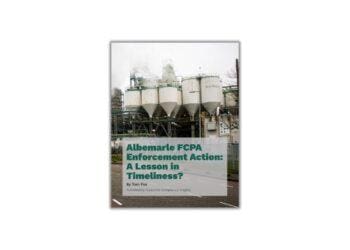This article was republished with permission from Michael Volkov’s Corruption, Crime & Compliance.
One of the hardest issues for compliance professionals is encouraging employees to raise concerns about ethics and compliance issues. It becomes even more difficult when the government establishes whistleblower programs offering financial rewards for employees to tell the government about the problems.
Employee surveys provide important and interesting information. A recent survey by CEB (here) found that only 5 percent of employee concerns are reported on a company’s hotline system.
Where do employees report their concerns? Employees look for human contact; they report the issue to their managers, most likely their immediate supervisors (unless the problem relates to that supervisor). Approximately 70 percent of surveyed employees want to report misconduct to their direct managers.
Unfortunately, over half of the managers reported being unprepared to handle employee concerns when they receive them.
Companies have to spend time addressing this issue. The issue can be handled with several strategies: (1) managers have to be specifically trained on how to handle employee concerns, (2) managers have to be given real performance incentives on this issue as part of their evaluations and (3) company officials have to devote communications resources to reinforcing the company’s culture and values to create an environment and expectation that managers will raise employee concerns.
Companies have to focus on escalation policies and practices. It is an important metric to use when assessing a compliance program. Instead of focusing on the number of hotline complaints, a more important measure – one which could be captured in a survey and/or in focus groups – is whether managers have escalated employee concerns within the company.
Sometimes managers may feel conflicted about raising an issue because they fear the issue will reflect poorly on their own performance. That natural hesitation has to be overcome by policies and incentives for its managers, as well as in the company’s culture and values.
If raising an employee concern is rewarded (tangibly and intangibly), managers will feel more comfortable about raising the issue. A company has to create an environment where such reporting is welcomed and embraced.
A second significant avenue for employees to use is reporting to a company’s human resources department. In the CEB survey, nearly one-quarter of employees surveyed stated they would report the issue to the human resources office.
This is another important reminder to a CCO of the importance of coordinating with the company’s human resources department. A specific protocol for receiving the complaint and sharing the information with appropriate officials has to be developed and ingrained in the human resources department.
Human resources departments are naturally inclined to hold this information close to the vest. That should be discouraged except in appropriate cases where other corporate functions are not implicated.
Compliance officers and human resource officers have to work hand-in-hand on a number of issues. This is just another issue that needs to be added to the list.



 Michael Volkov is the CEO of The Volkov Law Group LLC, where he provides compliance, internal investigation and white collar defense services. He can be reached at
Michael Volkov is the CEO of The Volkov Law Group LLC, where he provides compliance, internal investigation and white collar defense services. He can be reached at 





